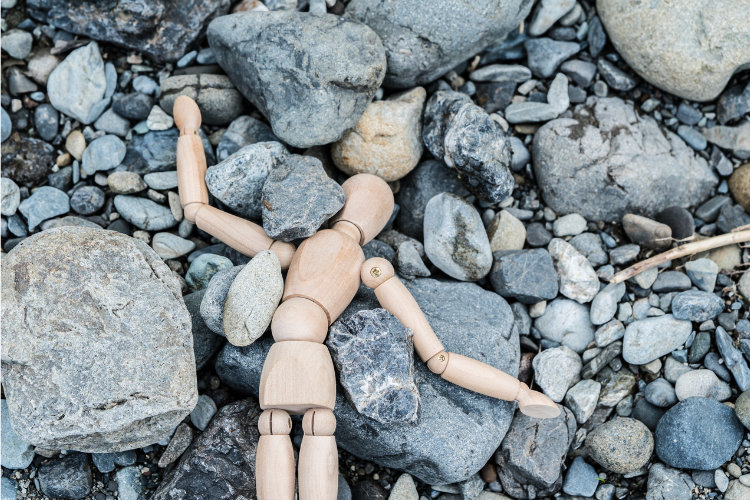By Debbie Hampton, The Best Brain Possible
A divorced mother of two learns important life lessons only after she attempted suicide, damaging her brain, but emerging whole in ways she'd never considered before
After caring for my brother as he wasted away from AIDS and died, the ugly ending of my 18-year marriage to my high school sweetheart and feeling flat-out disappointed with life, I tried to end my life in June 2007. I swallowed handful after handful of pills. Because I was found too late for my stomach to be pumped, the pills went all the way through my body wreaking destruction.
I woke up after a week in a coma with an acquired brain injury and serious impairment. Trying to live an ordinary life doing normal things – emptying the dishwasher, making a meal, having a conversation, paying the bills, using the computer – was frustratingly difficult.
My body and mind were a mess. Putting thoughts into words was a slow process that required intentional mental effort. When I did talk, it sounded like my mouth was wired shut and crammed full of marbles. I couldn’t coordinate the acts of breathing and swallowing. My hands shook constantly without fine motor control. I couldn’t remember the date, the ages of my two sons or the divorce.
Then, my ex-husband sued me for custody of our boys, won and moved out-of-state with them. And I thought things were bad before?
After that, I practiced determination and discipline. Every day for years, I read, examined my thoughts and feelings and did things differently. Along with the miracle of neuroplasticity – the brain's ability to evolve in response to life experiences – a new me emerged. I felt stronger, happier and mentally and physically healthier.
Philosopher Friedrich Nietzsche said, “That which does not kill us, makes us stronger.” It sure is true for me. I’ll tell you a few things I learned along the way by using some quotations.
1) No one can make you feel inferior without your consent
At first, I was ashamed to admit that I had tried to kill myself, had my children removed and lived with mental health challenges. Then, during the first year of my recovery, I realized that shame was like a dagger I was plunging into my own heart. I began to talk about these gasp-worthy events openly and learned the shame only existed if I imposed it on myself. Eleanor Roosevelt was right.
2) The only thing that’s certain is uncertainty
That's my statement. I’ve learned not to judge anything when it first presents itself, even if it’s completely different from what I expected (and it usually is). We can’t begin to know if circumstances are “good” or “bad” when they first show up; our thinking about the situation makes it so. A breakup is painful, but it also may lead to finding "The One." Being laid off is scary, but it can lead to a passionate new career. You just never know. Stay open to possibilities.
3) You may have been given a cactus, but you don’t have to sit on it
Joyce Meyer's metaphor helped me realize that experiences in my life were a cactus garden, but I was the one who kept plopping my behind on it. Every time I wallowed in self-pity, every time I tortured myself with painful memories, every time I knee-jerk reacted to my ex’s antics, I was taking a running jump and landing right on those needles. Now, I realize that my experience of anything is determined not by the actual circumstances, but by my behavior and thoughts about the situation.
4) The only difference between stumbling blocks and stepping stones is how you use them
Zig Ziglar's quote reminds me that I can make almost every situation, no matter how dismal initially, instantly better through my perspective. I just ask one little question: how can I make this work for me? This simple question changes my perspective from that of a victim at the mercy of random circumstances to a conscious, empowered person who chooses how to deal with what’s in front of me and work with it. It’s a much better use of my energy than freaking out.
5) I am not what happened to me; I am what I choose to become
I learned from Carl Jung that everything in our lives is a reflection of the thoughts we think, the choices we make, the actions we take and the words we use. Those seemingly insignificant, in-the-moment decisions that we make every day about how to spend our time, the company we keep, what we put in our mouths and what comes out of our mouths make our reality. The choices I make today are creating my reality and building my tomorrow.
6) You have power over your mind, not outside events; realize this and you will find strength
I can't control anything outside me; the only thing I ever have control of is myself. This lesson from Marcus Aurelius was a hard one. Learning to respond thoughtfully rather than reacting in a knee-jerk way, has made a huge, positive difference in my life. I used to be highly reactive which could make a bad situation, or even a good one, worse and lead to damaging consequences. Learning to be nonreactive is a continual challenge, but it does get easier the more I override my reptilian brain and engage my responsive brain.
7) What screws us up most in life is the picture in our heads of how it’s supposed to be
This quote by Glennon Doyle helped me realize that there is no “should be.” There is only what is. I can alleviate almost all suffering by getting rid of the “shoulds” and consciously being open to whatever unfolds. Buddhism and other philosophies teach that emotional torment and suffering come from our attachment to our thoughts about what's happening, not what is actually happening. Our pain originates in the space between our thoughts and reality.
8) Whatever the present moment contains, accept it as if you had chosen it
It’s my job to find the good in any situation; it's always present somewhere in the picture. Eckhart Tolle showed me if I look for the good, I’ll find it. With this attitude, things always turn out good because I define “good." Our brains are wired to look for and hang onto the bad. You have to make an effort to notice and remember the good. Even “bad” things often contain seeds for good experiences. What lessons did you learn? Are you stronger for going through the experience? What did you gain?
As I was slogging through the mess I’d made of my brain and my life, I developed a mantra: “When you’ve hit rock bottom, there’s nowhere to go but up.” I like up!
Debbie Hampton is a mental health writer whose work has appeared in Huffington Post, Tiny Buddha, MindBodyGreen and Men’s Health UK. She has authored three highly rated books, including Sex, Suicide and Serotonin, Beat Depression and Anxiety By Changing Your Brain: Simple Practices That Will Improve Your Life and How to Use Mindfulness as a Mental Health Tool. You can find more information and inspiration in her website, The Best Brain Possible.


